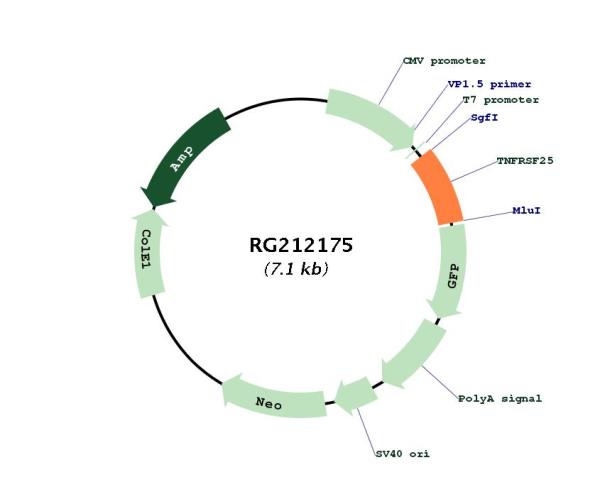DR3 (TNFRSF25) (NM_001039664) Human Tagged ORF Clone
CAT#: RG212175
- TrueORF®
TNFRSF25 (tGFP-tagged) - Human tumor necrosis factor receptor superfamily, member 25 (TNFRSF25), transcript variant 12
ORF Plasmid: DDK
Lentiviral Particles: DDK w/ Puro mGFP w/ Puro
"NM_001039664" in other vectors (4)
Specifications
| Product Data | |
| Type | Human Tagged ORF Clone |
| Tag | TurboGFP |
| Symbol | DR3 |
| Synonyms | APO-3; DDR3; DR3; GEF720; LARD; PLEKHG5; TNFRSF12; TR3; TRAMP; WSL-1; WSL-LR |
| Vector | pCMV6-AC-GFP |
| E. coli Selection | Ampicillin (100 ug/mL) |
| Mammalian Cell Selection | Neomycin |
| Sequence Data |
>RG212175 representing NM_001039664
Red=Cloning site Blue=ORF Green=Tags(s) TTTTGTAATACGACTCACTATAGGGCGGCCGGGAATTCGTCGACTGGATCCGGTACCGAGGAGATCTGCC GCCGCGATCGCC ATGGAGCAGCGGCCGCGGGGCTGCGCGGCGGTGGCGGCGGCGCTCCTCCTGGTGCTGCTGGGGGCCCGGG CCCAGGGCGGCACTCGTAGCCCCAGGTGTGACTGTGCCGGTGACTTCCACAAGAAGATTGGTCTGTTTTG TTGCAGAGGCTGCCCAGCGGGGCACTACCTGAAGGCCCCTTGCACGGAGCCCTGCGGCAACTCCACCTGC CTTGTGTGTCCCCAAGACACCTTCTTGGCCTGGGAGAACCACCATAATTCTGAATGTGCCCGCTGCCAGG CCTGTGATGAGCAGGCCTCCCAGGTGGCGCTGGAGAACTGTTCAGCAGTGGCCGACACCCGCTGTGGCTG TAAGCCAGGCTGGTTTGTGGAGTGCCAGGTCAGCCAATGTGTCAGCAGTTCACCCTTCTACTGCCAACCA TGCCTAGACTGCGGGGCCCTGCACCGCCACACACGGCTACTCTGTTCCCGCAGAGATACTGACTGTGGGA CCTGCCTGCCTGGCTTCTATGAACATGGCGATGGCTGCGTGTCCTGCCCCACG ACGCGTACGCGGCCGCTCGAG - GFP Tag - GTTTAA >RG212175 representing NM_001039664
Red=Cloning site Green=Tags(s) MEQRPRGCAAVAAALLLVLLGARAQGGTRSPRCDCAGDFHKKIGLFCCRGCPAGHYLKAPCTEPCGNSTC LVCPQDTFLAWENHHNSECARCQACDEQASQVALENCSAVADTRCGCKPGWFVECQVSQCVSSSPFYCQP CLDCGALHRHTRLLCSRRDTDCGTCLPGFYEHGDGCVSCPT TRTRPLE - GFP Tag - V |
| Restriction Sites |
SgfI-MluI
Cloning Scheme for this gene
Plasmid Map

|
| ACCN | NM_001039664 |
| ORF Size | 543 bp |
| OTI Disclaimer | The molecular sequence of this clone aligns with the gene accession number as a point of reference only. However, individual transcript sequences of the same gene can differ through naturally occurring variations (e.g. polymorphisms), each with its own valid existence. This clone is substantially in agreement with the reference, but a complete review of all prevailing variants is recommended prior to use. More info |
| OTI Annotation | This clone was engineered to express the complete ORF with an expression tag. Expression varies depending on the nature of the gene. |
| Product Components | The ORF clone is ion-exchange column purified and shipped in a 2D barcoded Matrix tube containing 10ug of transfection-ready, dried plasmid DNA (reconstitute with 100 ul of water). |
| Reconstitution | 1. Centrifuge at 5,000xg for 5min. 2. Carefully open the tube and add 100ul of sterile water to dissolve the DNA. 3. Close the tube and incubate for 10 minutes at room temperature. 4. Briefly vortex the tube and then do a quick spin (less than 5000xg) to concentrate the liquid at the bottom. 5. Store the suspended plasmid at -20°C. The DNA is stable for at least one year from date of shipping when stored at -20°C. |
| Reference Data | |
| RefSeq | NM_001039664.1, NP_001034753.1 |
| RefSeq Size | 894 bp |
| RefSeq ORF | 546 bp |
| Locus ID | 8718 |
| UniProt ID | Q93038 |
| Cytogenetics | 1p36.31 |
| Protein Families | Druggable Genome, Transmembrane |
| Protein Pathways | Cytokine-cytokine receptor interaction |
| Gene Summary | The protein encoded by this gene is a member of the TNF-receptor superfamily. This receptor is expressed preferentially in the tissues enriched in lymphocytes, and it may play a role in regulating lymphocyte homeostasis. This receptor has been shown to stimulate NF-kappa B activity and regulate cell apoptosis. The signal transduction of this receptor is mediated by various death domain containing adaptor proteins. Knockout studies in mice suggested the role of this gene in the removal of self-reactive T cells in the thymus. Multiple alternatively spliced transcript variants of this gene encoding distinct isoforms have been reported, most of which are potentially secreted molecules. The alternative splicing of this gene in B and T cells encounters a programmed change upon T-cell activation, which predominantly produces full-length, membrane bound isoforms, and is thought to be involved in controlling lymphocyte proliferation induced by T-cell activation. [provided by RefSeq, Jul 2008] |
Documents
| Product Manuals |
| FAQs |
| SDS |
Resources
Other Versions
| SKU | Description | Size | Price |
|---|---|---|---|
| RC212175 | TNFRSF25 (Myc-DDK-tagged)-Human tumor necrosis factor receptor superfamily, member 25 (TNFRSF25), transcript variant 12 |
USD 330.00 |
|
| RC212175L3 | Lenti-ORF clone of TNFRSF25 (Myc-DDK-tagged)-Human tumor necrosis factor receptor superfamily, member 25 (TNFRSF25), transcript variant 12 |
USD 630.00 |
|
| RC212175L4 | Lenti-ORF clone of TNFRSF25 (mGFP-tagged)-Human tumor necrosis factor receptor superfamily, member 25 (TNFRSF25), transcript variant 12 |
USD 630.00 |
|
| SC310758 | TNFRSF25 (untagged)-Human tumor necrosis factor receptor superfamily, member 25 (TNFRSF25), transcript variant 12 |
USD 330.00 |
{0} Product Review(s)
Be the first one to submit a review






























































































































































































































































 Germany
Germany
 Japan
Japan
 United Kingdom
United Kingdom
 China
China

